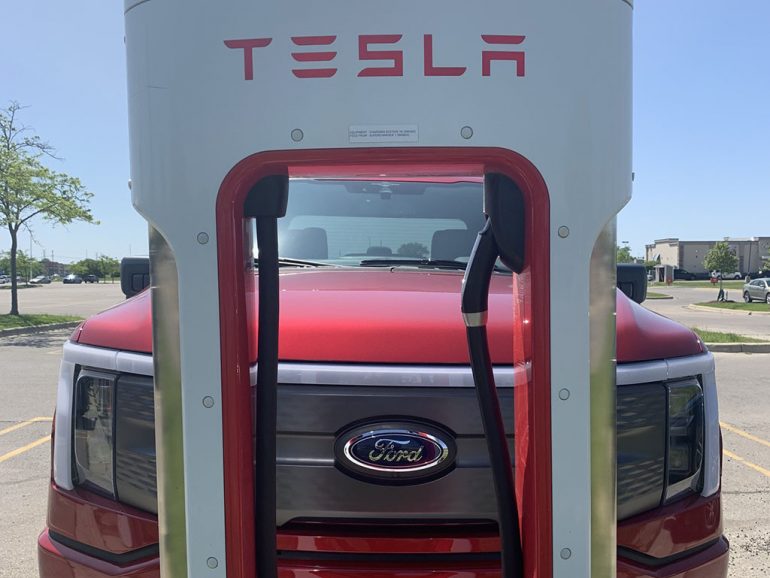
Ford Motor Co announced on Thursday that it has reached an agreement with Tesla to grant Ford electric vehicle (EV) owners access to more than 12,000 Tesla Superchargers across North America. This collaboration is set to begin in early 2024. Ford EVs equipped with the Combined Charging System (CCS) port will be able to use a Tesla-developed adapter to connect to Tesla’s V3 Superchargers. However, starting in 2025, Ford plans to equip its future EVs with a charge port that eliminates the need for an adapter, enabling direct access to Tesla Superchargers.
To discuss their joint efforts in accelerating EV adoption in North America, Tesla CEO Elon Musk and Ford CEO Jim Farley will engage in an online Twitter Spaces conversation. It is worth noting that Musk owns Twitter. This event follows a recent incident where Twitter experienced multiple crashes during an eagerly anticipated live audio chat between Musk and Florida Governor Ron DeSantis. The technical difficulties hindered Musk’s promotion of the social media platform he purchased for $44 billion in 2022.
Earlier in the day, at a Morgan Stanley forum, Farley expressed his belief in the necessity of collaboration among auto companies, calling it “unnatural” but crucial for progress. He specifically emphasized the need to address the industry’s lack of standardization, citing the multitude of plugs used for charging networks as a “totally ridiculous” situation.
In a show of support for Ford’s EV strategy, Musk tweeted his appreciation, describing it as smart and praising the high demand for Ford’s electric F-150 Lightning model. Musk also defended Ford regarding its losses in the EV business, acknowledging the challenges associated with introducing new vehicle lines amidst major technological shifts.
Farley further emphasized the importance of reaching out to competitors and forging unconventional partnerships, suggesting Ford’s willingness to collaborate with companies like Tesla, Nio Inc, and BYD. He highlighted Ford’s commitment to adopting a non-traditional approach in order to drive progress in the industry.
In recent times, Tesla has started opening its U.S. Supercharger networks to non-Tesla EVs using the CCS charging standard. This move aligns with the Biden administration’s goal of expanding charging infrastructure and has been supported by significant subsidies.
Overall, this agreement between Ford and Tesla marks a significant step forward in the collaboration between automakers and the development of charging infrastructure. It highlights the importance of standardization and the shared goal of promoting electric vehicle adoption in North America.

Mike Floyd is a finance executive by trade and a car enthusiast at heart. As a CFO with a keen eye for detail and strategy, Mike brings his analytical mindset to the automotive world, uncovering fresh insights and unique perspectives that go beyond the surface. His passion for cars—especially his favorite, the Porsche 911, fuels his contributions to Automotive Addicts, where he blends a love for performance and design with his professional precision. Whether he’s breaking down industry trends or spotlighting emerging innovations, Mike helps keep the site both sharp and forward-thinking.